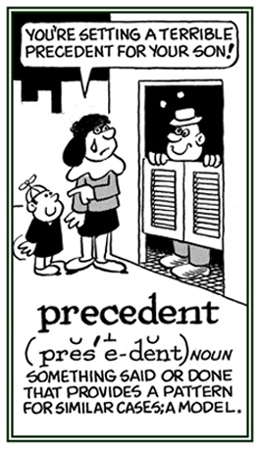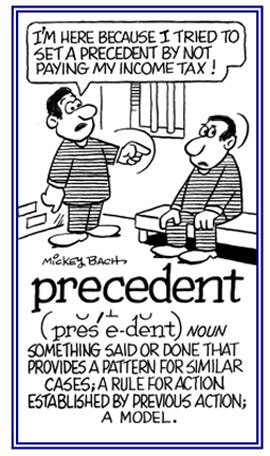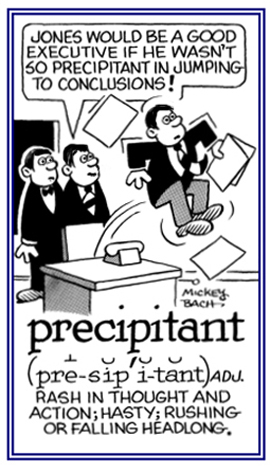pre-, prae-
(Latin: before [both in time and place])
The prefix prae- can actually be substituted for pre- because both of them are different spellings for the same prefix meaning "before".
2. An example that is used to justify similar occurrences at a later time: Margaret set a precedent by being the first woman executive in her company.
5. Etymology: "to go before" in rank or importance, from Modern French preceder, from Latin præcedere, "to go before" from præ-, "before" + cedere, "to go".


Go to this Word A Day Revisited Index
so you can see more of Mickey Bach's cartoons.
2. Etymology: from Latin praeceptum, "maxim, rule, order"; from praecipere, "to take before, to give rules to, to order, to anticipate"; from prae-, "before" + capere, "to take."


Go to this Word A Day Revisited Index
so you can see more of Mickey Bach's cartoons.
2. Etymology: from Latin pracceptor from praccept, "warned, instructed" from the verb praccipere, "to give rules to, to order, to teach"; from prae-, "before" + capere "to take."

Go to this Word A Day Revisited Index
so you can see more of Mickey Bach's cartoons.
2. Relating generally to a tutor or an instructor: To supplement his scholarship, Davis applied for a preceptorial position in the history department at his college.
3. Etymology: from Latin praeceptor, from praecep, "warned, instructed", from the verb praecipere, precipere, "to warn, to instruct"; from prae, pre, "before" + capere, "to take".
2. A woman who is the head or principal of a school: The sign on the list of distinguished persons read: Mrs. Johnson, preceptress (1919 - 1925).
2. In astronomy: the slow, conical motion of the earth's axis of rotation: Precession is caused by the gravitational attraction of the sun and moon, and to a smaller extent, of the planets, on the equatorial bulge of the earth.
In certain contexts, precession may refer to the precession that the Earth experiences, or the effects of this type of precession on astronomical observation, or to the precession of orbital objects.
2. The brink of a dangerous or disastrous situation: The school team was on the precipice of defeat.
Before he found out the results of his final examinations, Samuel felt as though he were at the edge of a precipice.
3. Etymology: from "fall to great depth"; from French précipice, from Latin præcipitium, "a steep place"; literally, "a fall" or "leap"; from præceps, præcipitis, "steep, headlong, headfirst"; from prae-, "in front" + caput, "head".
The meaning of "steep face of rock" is recorded from 1632.
The precipitance and quickness of the faculty members in submitting their resignations took the Board of Directors by surprise.
2. A reason or cause of a certain event or action: Jane thought that stress was the precipitant of the development of cancer in her breast.
When the rabbit jumped out of the grass, the precipitant action of the horse caused the rider to fall off!
2. Referring to an activity done too quickly and impulsively, often resulting in mistakes: The precipitant behavior of the students trying to complete their examination resulted in silly errors.
3. Etymology: from Latin praeciptans, "cast down headlong" from praecaps, "head foremost, headlong"; from prae-, "before" + caput, "head."

Go to this Word A Day Revisited Index
so you can see more of Mickey Bach's cartoons.
Related before-word units: ante-; antero-; anti-; pro-.
Related "time" units: aevum, evum; archaeo-, archeo-; Calendars; chrono-; horo-; Quotes: Time; tempo-.


